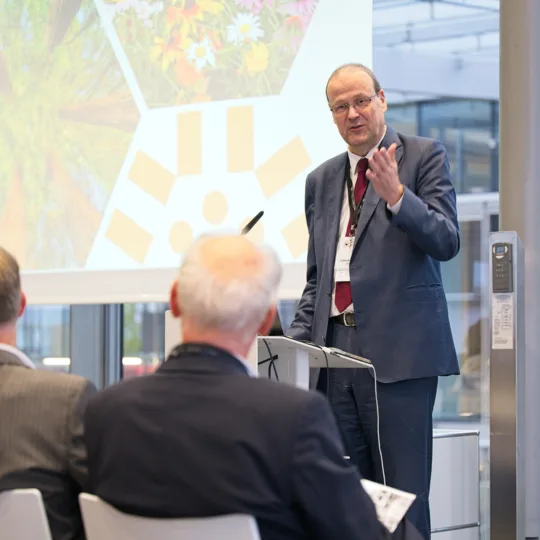Education, research and innovation as drivers of sustainable development
Swiss education, research and innovation policy is faced with challenges that have significance across all areas of the ERI-sector. One of these is sustainable development. Here is a brief overview of the relevant activities.

Switzerland gives great priority to sustainable development and supports efforts to achieve it. The Federal Council’s understanding of sustainable development is as follows: Sustainable development makes it possible to meet the basic needs of all people and ensures a good quality of life throughout the world, now and in the future. It encompasses the three dimensions of environmental responsibility, social solidarity and economic efficiency, and this on an equal and balanced basis.
By signing the United Nations (UN) 2030 Agenda for Sustainable Development in 2015, Switzerland declared its commitment to achieving the 17 Sustainable Development Goals and contributing to their implementation both nationally and internationally. In 2021, the Federal Council adopted its 2030 Sustainable Development Strategy (SDS 2030). In this policy paper, Switzerland establishes its priorities for implementation of the 2030 Agenda.
Education, research and innovation are drivers of sustainable development. The corresponding federal funding policy in the area of education, research and innovation (ERI) pursues two main objectives: first of all, sustainable development needs to be reinforced in order to contribute to implementation of the 2030 Agenda. Secondly, Switzerland needs to use sustainable development as a means of achieving a competitive advantage as an ERI location.
Sustainable development is one of four cross-cutting themes that are relevant to all ERI funding areas (see info box below). For example, sustainable development is the subject of the strategic multi-year plans of various stakeholders (Swiss Academies of Arts and Sciences, SFUVET, ETH Board, Innosuisse, SNSF, swissuniversities).
The ERI stakeholders pursue a number of activities relating to sustainable development, some of which are listed below.
Examples of activities in the area of research and innovation:
National Research Programmes
The Swiss National Science Foundation (SNSF) channels funding to research projects relating to sustainable development through National Research Programmes (NRPs). One example is NRP 82 ‘Biodiversity and Ecosystem Services’, which was launched in 2023.

Swiss Academies of Arts and Sciences
In the period 2025-2028, the Swiss Academies of Arts and Sciences will provide funding for the development of expertise based on the latest scientific findings in areas such as climate, energy, biodiversity or science north/south.
Innosuisse: Flagship initiative
With the Flagship Initiative, Innosuisse fosters systemic innovation and cross-disciplinary collaboration. The aim is to tackle current or future challenges that are relevant to a large part of the Swiss economy or society. The call for proposals launched in 2023 was devoted to the topic ‘Disruptive solutions for the transition towards a net zero world’. The eight approved flagships focus on such things as the circular economy, smart energy solutions as well as new materials and processes.
Higher education institutions: SWEET
Cantonal universities, the ETH Domain and universities of applied sciences work with both the public (at federal, cantonal and communal levels) and the private sector in the Swiss Energy Research for the Energy Transition (SWEET) funding programme run by the Swiss Federal Office of Energy (SFOE).
ETH institutions
In addition, ETH institutes play an active role in Joint Initiatives. For the strategic area ‘Energy, Climate and Ecological Sustainability’, two projects include ‘Proteins for a Sustainable Future’ or ‘Swiss Center of Excellence on Net-Zero Emissions (SCENE)’.
European Space Agency ESA
Switzerland is a member of the European Space Agency (ESA). Space technologies and systems are important tools enabling measurement of progress towards achieving the Sustainable Development Goals (SDGs). They also are a source of critical information for policymakers. ESA supports the 17 SDGs of Agenda 2030 and maintains a own complementary catalogue of activities supporting sustainable development as well as a Compendium of Earth Observation contributions to the SDG Targets and Indicators.

Examples of activities in the area of vocational and professional education and training:
VPET training content
The content of vocational and professional education and training programmes (VPET) is periodically reviewed and revised. Sustainable development is also taken into account in this process. SERI assists the professional organisations responsible for stewarding the given VPET programme. Such support includes, for example, conducting sustainability analyses or encouraging dialogue between professionals to ensure that vocational and professional qualifications include the topic of sustainable development. This topic is also woven into SERI's core syllabus for Language, Communication and Society (LCS) and covered in preparatory courses for the federal vocational baccalaureate. As a cross-cutting topic, it also flows into the core syllabus for VET professionals’ training.
This list is not exhaustive. More information on sustainable development activities in the ERI sector can be found here.
Cross-cutting themes
On 8 March 2024, the Federal Council submitted the ERI Dispatch for 2025-2028 to the Swiss Parliament. The aim of its ERI policy is to ensure that Switzerland remains an international leader in education, research and innovation. To achieve this, the Federal Council plans to commit up to CHF 29.2 billion in funding for the years 2025-2028. There are four cross-cutting themes that are relevant to all funding areas:
- Digitalisation
- Sustainable development
- Equal opportunities
- National and international cooperation
It is possible for there to be interactions and overlaps between the four themes. For example, digitalisation leads to innovative developments that improve efficiency. At the same time, digitalisation should be sustainably encouraged in the interests of the environment, society and democracy.
Contact
Author



